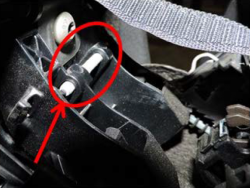
— A Chrysler active head restraint system class action lawsuit alleges the headrest will deploy and knock an occupant in their head without need of a crash impact.
According to the class action, these models are equipped with the allegedly defective active head restraint systems.
- 2010-2018 Dodge Journey
- 2010-2011 Dodge Nitro
- 2010-2012 Jeep Liberty
- 2010-2017 Jeep Patriot or Compass
- 2010-2012 Dodge Caliber
- 2010-2018 Dodge Caravan
- 2010-2018 Chrysler Town & Country
- 2011-2018 Dodge Durango
- 2011-2018 Jeep Grand Cherokee
- 2010-2014 Chrysler Sebring/Avenger
- 2010-2014 Chrysler 200
The plaintiffs argue FCA should have told them about defects in the active head restraint systems, but instead the automaker concealed its knowledge about the headrests.
In 2010, Fiat Chrysler (FCA US) began equipping certain vehicles with active head restraint systems manufactured by Grammer. An active head restraint should help prevent a driver or passenger from whiplash in a rear-end crash.
The lawsuit says an active head restraint system uses a padded front and padded back with two springs that sit between these two sections. The front padded portion of the headrest contains a plastic bracket, called the sled, which contains a metal rod called a striker pin.
The back padded portion of the headrest contains a hook that is connected to a sensor.
When the headrest hasn't deployed, also known as loaded, the springs in the middle of the headrest portions are compressed and the hook in the back portion grabs the striker pin in the front portion. The class action says this holds the headrest together and keeps it in place.
When the sensor inside the active head restraint system detects a rear-end crash, the hook releases the striker pin and the front portion of the headrest deploys to catch the head of the driver or passenger.
The plaintiff claims the head restraint system suddenly activates because of weak plastic polymer for the sled and "its negative interaction with a chemical compound present in a coating on the striker pins."
According to the lawsuit, the plastic polymer is not strong enough to withstand interaction with the compound. Cracks in the plastic appear when the compound on the striker pin contacts the plastic polymer under load.
The plastic allegedly degrades in the sled to the point the sled cannot withstand the pressure of the spring-loaded headrest and deploys the headrest when the sled breaks.
When a customer complains about a headrest that deploys without an impact, FCA allegedly accuses the owner of tampering with the system and forces the customer to pay for repairs. Those active head restrain repairs can allegedly cost more than $800 for just one headrest.
The class action alleges when a customer cannot pay hundreds for repairs, occupants must travel with headrests that have already deployed, or cope with using ropes or other items to keep the headrests together.
The class action alleges the government received 94 Chrysler active head restraint complaints during a three-year period before October 2018, with 35 consumers claiming the headrests suddenly deployed while driving.
At least 25 of those complaints indicated the failures occurred due to the plastic brackets, and 15 consumers reported injuries to their necks, heads and faces.
One of the plaintiffs says she was driving a 2015 Jeep Grand Cherokee in February 2020 when the head restraint deployed even though no crash occurred. The driver was smacked in her head, distracting her from the road and allegedly causing chronic migraine headaches and neck pain that continue today.
The Chrysler active head restraint system class action lawsuit was filed in the U.S. District Court for the District of Massachusetts: Costa, et al., v. FCA US LLC, et al.
The plaintiffs are represented by Andrus Wagstaff, PC, Lieff Cabraser Heimann & Bernstein, LLP, and Kershaw, Cook & Talley PC.




